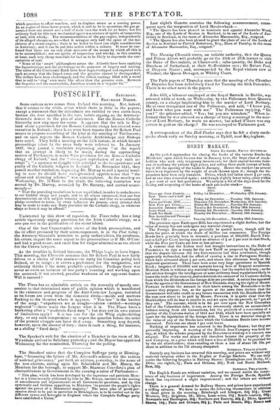POSTSCRIPT. SATURDAY.
SATURDAY NIGHT.
Some curious news comes from Ireland this morning. Not, indeed, that it relates to the trials, about which there is little in the papers; except a statement that the defendants are entitled to two extra days, besides the four specified in the rule, before arguing on the Attorney- General's demur to the plea of abatement. But the Roman Catholic hierarchy now step upon the scene. It appears that the talk in Eng- land about a provision for the Roman Catholic clergy has created some sensation in Ireland ; there have even been reports that Sir Robert Peel means to propose something of the kind at the meeting of Parliament ; and on such reports the Roman Catholic Archbishops and Bishops have acted. They held a meeting on the 15th instant, at which former proceedings taken by the same body were referred to. In January 1837, they passed a resolution expressing alarm "at the report that an attempt is likely to be made, during the approaching session of Parliament, to make Slate provision for the Roman Catholic clergy of Ireland," and the "strongest reprobation of any such at- tempt"; "a measure so fraught a ith mischief to the independence and purity of the Catholic religion in Ireland." In November 1841, they passed another resolution, requesting Dr. Murray to call a special meet- ing in case he should have ell-grounded apprehension that "the odious and alarming scheme" was contemplated. At the meeting on Wednesday, Dr. M•Hale in the chair, the following resolution was moved by Dr. Murray, seconded by Dr. Slattery, and carried unani- mously— " That the preceding resolutions be now republished, in order to make known to our faithful clergy and people, and to all others concerned, that our firm determination on this subject remains unchanged; and that we unanimously pledge ourselves to resist, by every influence we possess, every attempt that may be made to make any State provision for the Catholic clergy, in whatever shape or form it may be offered."
Undeterred by this show of repulsion, the Times today has a long article vigorously urging provision for the Irish Catholic clergy, as a sine qua non in the pacification of the sister island.
One of the best Conservative views of the Irish prosecutions, and the ill Effect produced by their mismanagement, is in the Post today : the Attorney-General's attention to petty technicalities, his petulance, his errors, impart the same aspect to the prosecutions as if Mr. O'Con- nell had a good cause, and exalt him for vulgar admiration as too clever for the Crown lawyers.
As the troubles in Ireland increase, the Whigs begin to have hopes. This morning, the Chronicle assumes that Sir Robert Peel is now fairly driven to a choice of two courses—to carry his Canadian policy into Ireland, or to resign ; it avows a preference for the resignation, and evidently thinks it the more probable expedient. Perhaps there was never so overt an instance of one party's counting and working upon the assumed, if not avowed, peculiar weakness of an opponent leader. Will it succeed ?
























 Previous page
Previous page